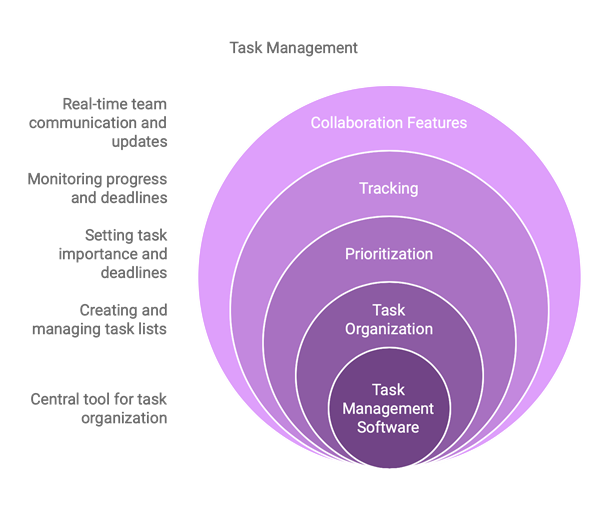
Task Management Key Functionalities
Task Creation
Easily add tasks with descriptions, due dates, and priority levels.
Organization
Use folders, tags, or categories to keep tasks organized.
Deadlines and Reminders
Set due dates and receive notifications to stay on track.
Collaboration Tools
Share tasks with team members and comment for feedback.
Progress Tracking
Visualize progress with charts or dashboards.
Integrations
Connect with other tools like calendars, email, and project management software for seamless workflow.
Whether for personal use or team projects, task management software enhances productivity by providing clarity and structure, ensuring that nothing falls through the cracks.
Benefits of Using Software for Task Management
Using software for task management offers a variety of benefits that can enhance productivity and organization. Here are some key advantages.
Improved Organization
Task management software helps keep all your tasks in one place, making it easier to prioritize and track what needs to be done.
Enhanced Collaboration
Teams can work together more effectively by sharing tasks, assigning responsibilities, and communicating in real time, reducing the chances of miscommunication.
Increased Accountability
By assigning tasks to specific individuals, everyone knows their responsibilities, which fosters accountability and ownership.
Better Time Management
With features like deadlines and reminders, users can manage their time more efficiently and avoid last-minute rushes.
Visual Progress Tracking
Many tools offer visual dashboards and progress indicators, allowing users to quickly assess how much work is completed and what still needs attention.
Streamlined Workflow
Integrations with other tools (like calendars and email) create a seamless workflow, reducing the need to switch between different applications.
Flexibility
Task management software can adapt to various workflows, whether for personal tasks, team projects, or even complex initiatives.
Accessibility
Cloud-based solutions allow users to access their tasks from anywhere, on any device, which is especially useful for remote teams.
Historical Insights
Many applications provide analytics and reporting features, helping users analyze past performance and improve future productivity.
Overall, using task management software not only simplifies the process of managing tasks but also fosters a more productive and collaborative environment.


How Software Generates Smart Report Analytics in Task Management
Software for task management generates smart report analytics through a combination of data collection, processing, and visualization techniques. Here’s how it typically work
Data Collection
As users create and manage tasks, the software collects relevant data, such as task completion times, deadlines met, and user interactions. This data is gathered continuously, providing a comprehensive overview of productivity.
Performance Metrics
The software analyzes the collected data to generate key performance indicators (KPIs). Common metrics include task completion rates, average time spent on tasks, and individual or team workload.
Automated Analysis
Using algorithms, the software automatically identifies trends and patterns within the data. For example, it may highlight bottlenecks in workflow or reveal which tasks consistently take longer than expected.
Customizable Reports
Users can often customize reports based on their specific needs. They might choose to focus on individual performance, team productivity, or project timelines, allowing for targeted insights.
Visual Dashboards
The software typically presents analytics through user-friendly dashboards. These visual representations, such as graphs and charts, make it easier to interpret data at a glance, enabling quick decision-making.
Historical Comparisons
By comparing current performance with past data, the software provides insights into improvements or declines in productivity, helping teams adapt their strategies over time.
Actionable Insights
The analytics often include recommendations based on the data. For example, if a team consistently struggles with a particular type of task, the software might suggest process adjustments or additional resources.
Integration with Other Tools
Many task management systems integrate with other software (like calendars or communication platforms), enriching the data pool and providing a more holistic view of productivity across different tools.
Overall, smart report analytics in task management software not only enhances understanding of team performance but also empowers users to make informed decisions that drive efficiency and effectiveness.

